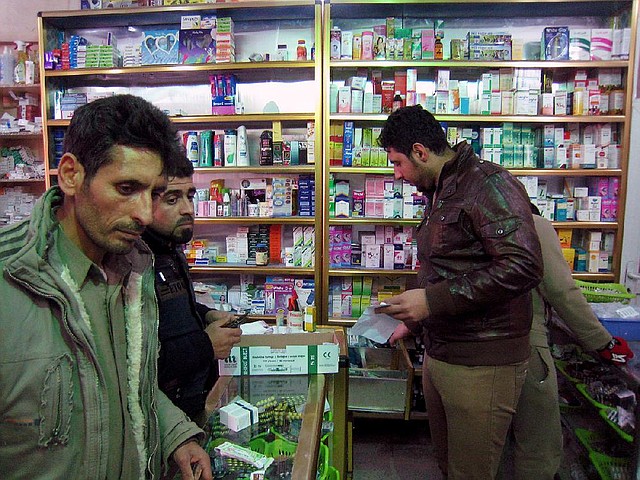Iraqis urged to push out al-Qaida
Iran offers support, no troops, to help retake Fallujah
Civilians buy medicine from the only open pharmacy in Fallujah, 40 miles (65 kilometers) west of Baghdad, Iraq, Monday, Jan. 6, 2014. Clashes continued late Sunday and early morning Monday between al-Qaida and Iraqi troops on the main highway that links the capital, Baghdad, to neighboring Syria and Jordan. Al-Qaida fighters and allied tribes are still controlling the center of the city where they are deployed in streets and around government buildings. (AP Photo)
Tuesday, January 7, 2014
BAGHDAD - Iraq’s prime minister urged Fallujah residents Monday to expel al-Qaida militants to avoid an all-out battle in the besieged city, a sign that the government is paving the way for a military push to rout hard-line Sunni insurgents challenging for territorial control over the western approaches to Baghdad.
The militants’ seizure of Fallujah and parts of nearby Ramadi, once bloody battlegrounds for U.S. troops, has marked the most direct challenge to Prime Minister Nouri al-Maliki’s government since the departure of American forces two years ago. Both the U.S. and its longtime rival Iran are worried about the escalating conflict, with neither wanting to see al-Qaida take firmer root inside Iraq.
The U.S. has offered assistance in the fight, and Tehran signaled Monday that it is willing to follow suit, saying it is ready to help Iraq battle al-Qaida “terrorists” by sending military equipment and advisers should Baghdad ask for it.
Gen. Mohammad Hejazi, the deputy commander of Iran’s armed forces, told local journalists that Iran could support the Iraqi government but was not planning to send troops.
“Such a request has not been officially made,” Hejazi said, according to the government-controlled Islamic Republic News Agency. “Equipment and advice will be given if they ask for it, but as for forces, the Iraqis are very powerful themselves.”
The Iranian offer came a day after U.S. Secretary of State John Kerry offered similar assistance to the Iraqi government while stressing that the U.S. would not send any military forces. Iraqi troops have been trying to remove fighters from the al-Qaida-affiliated group known as the Islamic State of Iraq and the Levant from two crucial cities the militants overran last week.
Hejazi said Iran would not engage in any form of a joint mission with the U.S.
“Since we have no official relationship with America, I do not think we will be conducting any joint operations,” he said.
Iraqi government troops have surrounded Fallujah, which was overrun by fighters from al-Qaida’s Iraq branch last week. The city is just 40 miles west of the Iraqi capital, Baghdad. It is located in the Sunni-dominated and largely desert province of Anbar.
Al-Maliki did not say how he expects Fallujah residents and pro-government tribesmen to push out the militants. In his message, broadcast over state TV, he also urged Iraqi troops to avoid targeting residential areas.
Iraqi troops have been trying to dislodge the militants from the two cities. On Sunday, fighting pitting the militant extremists against government forces and allied tribesmen in Anbar killed dozens of people, including 22 soldiers, 10 civilians and an unknown number of militants.
Col. Steve Warren, a Pentagon spokesman, said Monday that the U.S. is expediting the delivery of 10 Scan Eagle drones and 100 Hellfire missiles and expects they will get to Iraq in the spring.
On Monday night, Vice President Joe Biden called al-Maliki to reaffirm that the U.S. stands with Iraq against the al-Qaida militants, the White House said.
Biden also spoke with Parliament Speaker Osama al-Nujaifi, a Sunni leader. The White House said the two discussed ways to sustain cooperation between Sunni communities and the Shiite-led government, and that Al-Nujaifi said he’s committed to fighting terrorism.
Fallujah residents said clashes continued into Monday along the main highway that links Baghdad with neighboring Syria and Jordan.
The Anbar Military Command reported that Iraqi forces killed an unspecified number of militants by firing on their vehicles from the air over the village of Karma, near Fallujah. Fighters from a pro-government Sunni militia killed six militants in a firefight outside Fallujah on Monday, a police officer said.
Sporadic clashes broke out in some parts of Ramadi, residents said. The Anbar provincial government said three rockets struck the military operations command center.
Also Monday, militants in a speeding car attacked an Iraqi army checkpoint in the mainly Sunni Baghdad suburb of Abu Ghraib, which is near Anbar, killing two soldiers and wounding four others, a police officer and a medical official said. All officials spoke on condition of anonymity because they were not authorized to talk to media.
The unrest in Anbar began Dec. 28, when Iraqi security forces arrested a Sunni lawmaker on terrorism charges. Two days later, the government dismantled a months-old, anti-government Sunni protest camp, sparking clashes with militants.
Elsewhere, the White House is pushing back against critics who say the U.S. pullout from Iraq is to blame for the escalating sectarian violence.
White House spokesman Jay Carney said the violence was a problem even when there were 150,000 U.S. troops in the country.
Carney said President Barack Obama doesn’t believe the U.S. should again put troops on the ground in Iraq. Information for this article was contributed by Adam Schreck, Sinan Salaheddin, Qassim Abdul-Zahra, Ali Akbar Dareini, Lolita C. Baldor and staff members of The Associated Press; and by Thomas Erdbrink of The New York Times.
Front Section, Pages 6 on 01/07/2014

